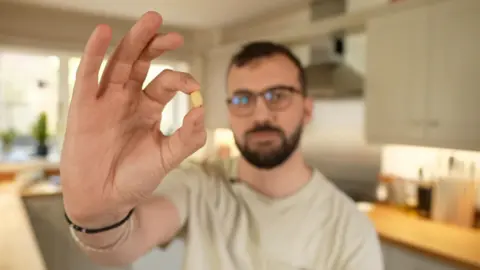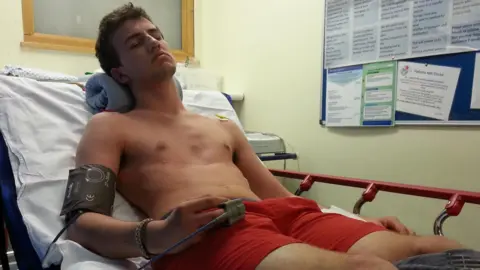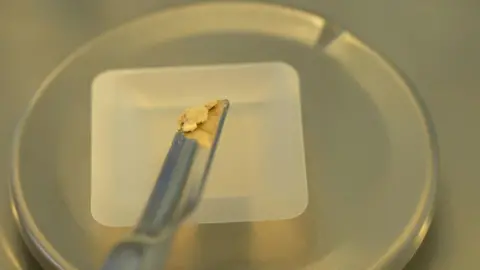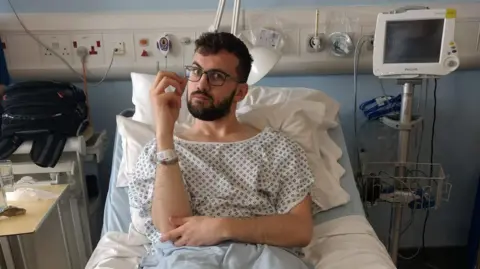'My peanut allergy nearly killed me - now I eat them every day for breakfast'
 BBC
BBCChris Brookes-Smith, 28, used to live in fear of dying from eating even the smallest trace of peanut.
Ten years ago he had his worst allergic reaction after ordering a curry at a local Indian takeaway. The trauma of it is seared into his memory.
"I knew I was in trouble after one bite," he says. "Within seconds there were spots on my lips. Within minutes I was vomiting. I could feel my throat closing up, hives forming in my armpits then over my whole body... My face going all puffy with the swelling."
His voice tails off, full of emotion.
"I thought I was going to die."
Photos taken in hospital later that day show the toll the reaction took on his body.
"I looked like a plucked turkey because my skin had blistered so much," Chris says.
But the most painful thing were the hives - red, raised bumps on the skin - which felt "like boiling water had been poured over me".
 Chris Brookes-Smith
Chris Brookes-SmithTrying to avoid peanuts, one of the most common food allergies, has been a way of life for Chris and millions of other adults with a serious allergy. Eating out, going to social events and travelling abroad are all fraught with anxiety.
As many as one in 200 adults and one in 50 children have a nut allergy, charities say. Some children grow out of their allergies, but many don't - and they continue into adulthood, often getting worse.
An allergic reaction occurs when the body reacts to the protein in peanuts, thinking it's a threat, which triggers a sudden release of chemicals. Symptoms can range from the mild to very serious.
Chris's allergy first came to light as a baby, when he developed a rash as his mum made peanut butter sandwiches.
Each reaction since has been worse than the one before, which means he's become accustomed to living every day "on high alert hoping nothing bad happens".
Activities such as going out with friends or eating in restaurants, which should be enjoyable, turned into stressful, potentially life-threatening experiences.
Despite a love of travel, Chris avoided going to countries where peanuts are commonly used, like south east Asia, after three allergic reactions on a trip to Italy.
As Chris grew up, his family constantly worried about him. But then his mum heard about a clinical trial at Guy's and St Thomas' NHS Foundation Trust and King's College London that would change her son's life.
It would test whether adults like Chris with serious peanut allergies could be desensitised by training their bodies to tolerate the very thing that could kill it, calming down the immune system when it would usually over-react.
Despite being "really nervous", Chris agreed to sign up.
From milligrams to whole nuts

Under the watchful eye of doctors, Chris started by eating a fraction of a milligram of peanut powder mixed with yoghurt. Over many months, the amount of peanut was gradually increased, slowly building up to Chris eating fractions of nuts and, finally, whole nuts.
By the end of the nine-month study, 14 of the 21 patients could eat the equivalent of five peanuts without having allergic reactions - including Chris.
Professor Stephen Till, who led the research, says the treatment "has potential to have a real impact on patients' lives".
"Most severe reactions occur because of mistakes, usually by somebody else, and miscommunication. So it provides them with some protection against that.
"They've taken control, if you like, of their peanut allergy now."
The method - called oral immunotherapy - is already proven to work for allergies to pollen, wasp and bee stings. It's only been used on food allergies in the last 20 years, and mostly in children whose immune systems are still developing. Adult allergies are thought to be harder to shift.
"Peanut allergy is very common in children and almost never goes away," says Prof Till. "Those young people are going to become adults, so we need treatments for adults too."
This trial, published in the journal Allergy, shows adults with serious allergies can increase the amount of peanut they can tolerate by 100 times.
 Chris Brookes-Smith
Chris Brookes-SmithChris, who lives in Northamptonshire, had no idea how he would react to even the slightest trace of peanut. Increasing that dose - willingly - every day was something he couldn't imagine.
"The first time I went there and I ingest this stuff, my heart's going a million miles an hour," he says. "The big jump in fear was going from peanut dust to half a whole nut."
But he was reassured by having a team of doctors and nurses present, with drugs such as adrenaline standing by in case of a severe, life-threatening reaction.
"You've got 100 eyes on you - nothing is gonna happen."
However, experts stress no one should try this at home on their own because of the risk of a serious allergic reaction occurring.
'Wonderful feeling'
Not everyone who tried the treatment was desensitised, and larger trials in more people will have to work out why that is.
"For some people, there were reactions and we had to slow down or go back a step," explains Prof Till. "But the message is that you can desensitise adults to peanuts -and there should be more focus on adults in the future."
Being able to eat peanuts safely had a huge impact on the lives of those who took part, the researchers say. It has given them freedom to travel, reduced their anxiety when eating out and removed their fear of food.
How to develop this into a practical treatment on the NHS is more of a challenge. First, larger trials are needed to prove it can work for more people.
And researchers are looking at whether putting drops of peanut in solution under the tongue could be a safer way of achieving the same end result.
Chris now eats four peanuts every morning with his breakfast granola to keep his allergy at bay – as recommended by his doctors.
He's grateful for having had the opportunity to take part in the trial and hopes many others with serious peanut allergies can also benefit from the treatment.
While he admits he still hates the flavour of peanuts, he says knowing he can now eat something that once sent his body into "nuclear meltdown" has changed his life.
"It's a wonderful feeling," Chris says. "I'm no longer afraid of dying."

Sign up here to receive our weekly newsletter highlighting uplifting stories and remarkable people from around the world.
